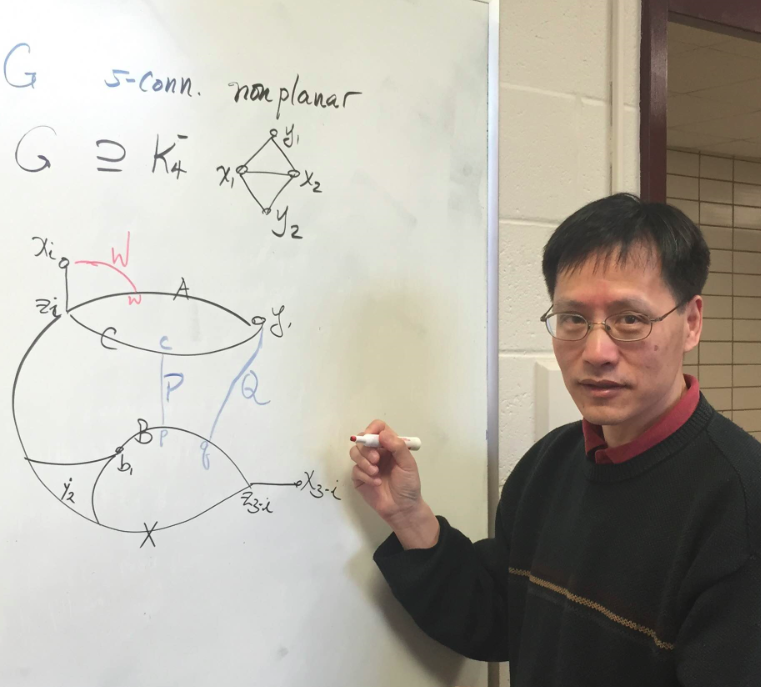- You are here:
- Home
April 11, 2016
| Atlanta, GA
What is your research about?
I work on theory and algorithms of graphs. A graph consists of nodes and links joining nodes. Many real-world situations, including social networks and communication networks, can be modeled by graphs.
My current research has two components: basic mathematics research in graph theory and application of graph theory to other areas of mathematics and engineering.
Examples of basic research in graph theory are problems related to the Four Color Theorem, which states: Given a map of countries, one can always color the countries with at most four colors such that countries sharing borders always have different colors. Techniques we developed may be used to solve other problems in graph theory, as well as related problems in theoretical computer science and engineering.
An example of applications of graph theory is a project I'm working on with engineering colleagues about radio-frequency, or spectrum, allocations for wireless communications. We use graph theory techniques to find good solutions to resource allocation problems formulated by engineering colleagues to address the technological challenges in spectrum trading.
Basic math research often leads to results and tools that can be used to solve practical problems or improve the known solutions to practical problems, which could benefit society. For example, our work on spectrum trading took advantage of underutilized communication spectra to make wireless networks more agile and efficient.
What has been the most exciting time so far in your research life?
In the past several years, I and several graduate students have been working on an old conjecture in graph theory, called the Kelmans-Seymour conjecture. We recently solved it. The work required some new techniques that will likely be useful for other problems. It will lead to PhD theses for the graduate students involved.
How did you find your way to mathematics research?
When I was in high school, I started participating in mathematics competitions and did well in them. So I gradually developed an interest in mathematics.
What advice would you give to a college freshman who wants to be a mathematician?
Build a good foundation of mathematics. Try to understand every bit of the details of what you see. Be patient; you may spend several hours (or even days) on a homework problem and not solve it. However, the thinking process itself is a very good mathematical training.
If you could not be a mathematician, in what line of work would you be now?
I honestly do not know. Maybe a musician, but I am not sure if I have the talent.
What is the most exciting thing about being a part of Georgia Tech?
I am surrounded by outstanding colleagues in mathematics. I can collaborate with engineering colleagues so that what I do in my basic research could be applied to more practical problems.
What are you most surprised about in your encounters with Georgia Tech students?
Most Tech students are good at math, want to learn math, and study very hard. I have taught at different places, where most students were not like this.
What is an unusual skill, talent, or quality you have that is not obvious to your colleagues?
I play table tennis reasonably well. Some of my colleagues know, some do not.
What is your ideal way of relaxing?
Listening to music, reading, and hiking, but I am unable to do so very often.
What three destinations are still in your travel to-do list?
Tibet is definitely one of them, but I have not seriously thought about this. Perhaps, I will wait until I retire.
If you won $10 Million in a lottery, what would you do with it?
I do not know. I've never thought about it.

